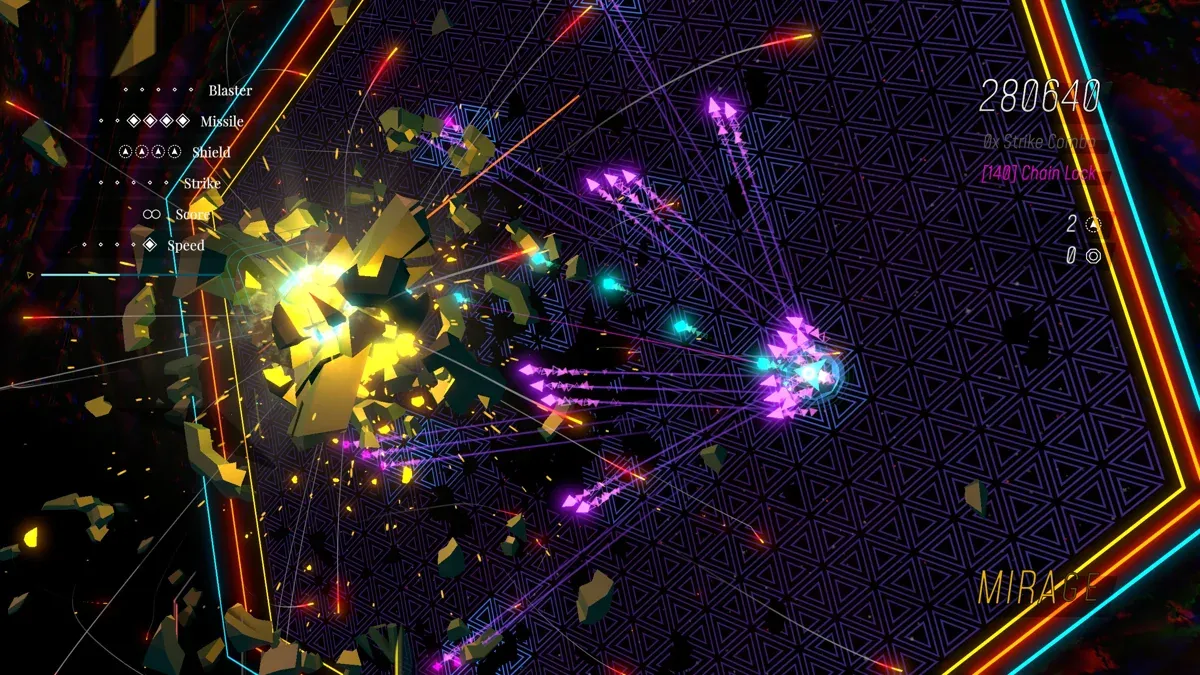Distributor provided a review copy.
There are only a handful of games I consider to be perfect. Not "perfect" in the sense that I enjoy them a whole lot, but rather perfect meaning you can't take anything out or put anything extra in them without ruining everything else. They exist in one shape as flawless creations.
These games are often simple yet complex all at once. Tetris is essentially just a game of stacking blocks, yet it grows harder and more demanding with every passing second. Super Mario Bros. is a simple 2D sidescrolling platformer that teaches you everything about its mechanics within the first screen, yet decades later people still master its nuances through speedruns and self-imposed challenges.
The most recent perfect title, for me, was Resogun, made by Housemarque. It was one of the early launch games for the PS4, meant to showcase the processing and graphical powers of the console as well as Housemarque's latest skills which they would put to good use in Returnal. Like their previous titles, Resogun is a 2D twin-stick shooter where the player fights against bullet hell -styled hoards of enemies while trying to rescue humans stuck on the battlefield.
This long preamble has a point: Sektori, developed by former Housemarque alumni Kimmo Lahtinen, is as perfect as a twin-stick shooter gets. It fundamentally understands the appeal of its genre and refines it to the most purest elements imaginable. This is gaming distilled to its core, and it is beautiful.

Sektori is a simple game to pick up and increasingly difficult to master. It features multiple difficulty levels, out of which even the easiest one one proves daunting. On top of that, there's a campaign of sorts, arcade, survival, and other skill-based modes along with a generational boss rush mode to test your skills. For a project made by a solo developer, it's a wonderfully stacked product that will provide tens, if not hundreds of hours of entertainment.
Each campaign run starts out the same: The player chooses a vessel to match their strengths and faces increasingly difficult waves of enemies numbering in the thousands. At the end of every level there's a larger boss battle that is randomized from a pool of opponents. These range from pushovers like a space worm to a devastatingly annoying bastard that occupies the entire map while firing pillars of lava at you.

Instead of traditional lives, your ship is guarded by shields, which you can stack by collecting power ups. Each power up requires a set amount of gold, which in turn is dropped by the enemies. Collect enough gold, get a level on a power up, and repeat. At first, it's quite hectic to keep an eye out on both your enemies and which power up is next in the queue, as you can't freely choose them from the lineup. But once you get a feel for the action, Sektori proves immensely enjoyable as you zip between bullets while getting stronger in the process.
Happily, Sektori also has a couple of accessibility options up its sleeve. Nothing major, but enough that someone like myself (with cognitive impairments) can enjoy the experience with only minor caveats. It's only when the game hits the MIRAGE speciality mode, kind of a Rainbow Road booster, that things get messy. In those scenarios, I have a hard time making out anything in the level. Allowing for color adjustments even further would help immensely here.

Sektori is some of the most pure fun I've had with any game this year. It hits every right trigger of excitement, tension, and endorphins you could want out of a twin-stick shooter. The intuitive design, amazing soundtrack, and smartly scaled difficulty all work together to create a refined and immensely rewarding experience.
It's one of those games that will rise in my estimation over time. Years from now, it'll casually drop in conversation like: "Man, they don't make them as good as classics like Sektori, huh?"








